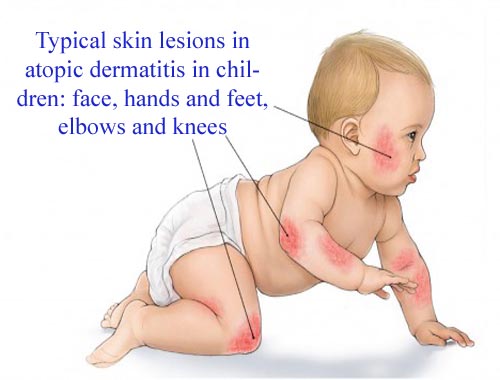Eczema, Atopic dermatitis

Published: 18 Jun 2025
ICD9: 691.8 ICD10: L20.89 ICD11: EA80
"Eczema" and "Atopic dermatitis" are essentially the same thing.
Atopic dermatitis is the most common type of eczema. Think of "eczema" as a broader category, and "atopic dermatitis" as a specific, and very common, type within that category.
Here's a breakdown:
![]() Eczema: This is a general term for a group of skin conditions that cause inflammation, itching, dryness, and rashes. There are several different types of eczema, including:
Eczema: This is a general term for a group of skin conditions that cause inflammation, itching, dryness, and rashes. There are several different types of eczema, including:![]()

![]() Atopic dermatitis (the most common)
Atopic dermatitis (the most common)![]()

![]() Contact dermatitis
Contact dermatitis![]()

![]() Dyshidrotic eczema
Dyshidrotic eczema![]()

![]() Nummular eczema
Nummular eczema![]()

![]() Seborrheic dermatitis
Seborrheic dermatitis![]()

![]() Stasis dermatitis
Stasis dermatitis
![]() Atopic dermatitis: This is a chronic (long-lasting) inflammatory skin condition characterized by:
Atopic dermatitis: This is a chronic (long-lasting) inflammatory skin condition characterized by:![]()

![]() Intense itching
Intense itching![]()

![]() Dry, scaly, or cracked skin
Dry, scaly, or cracked skin![]()

![]() Rashes, often on the face, elbows, knees, hands, and feet
Rashes, often on the face, elbows, knees, hands, and feet![]()

![]() Thickened, leathery skin (in chronic cases)
Thickened, leathery skin (in chronic cases)
Key Characteristics of Atopic Dermatitis:
![]() "Atopic": This refers to a tendency to develop allergic diseases, such as asthma, allergic rhinitis (hay fever), and food allergies. Many people with atopic dermatitis also have one or more of these other atopic conditions.
"Atopic": This refers to a tendency to develop allergic diseases, such as asthma, allergic rhinitis (hay fever), and food allergies. Many people with atopic dermatitis also have one or more of these other atopic conditions.
![]() Itch-Scratch Cycle: The intense itching leads to scratching, which further damages the skin and worsens the inflammation, perpetuating a cycle of itch and scratch.
Itch-Scratch Cycle: The intense itching leads to scratching, which further damages the skin and worsens the inflammation, perpetuating a cycle of itch and scratch.
![]() Barrier Dysfunction: The skin in people with atopic dermatitis often has a compromised barrier function. This means it's less able to retain moisture and protect against irritants and allergens, leading to dryness and increased sensitivity.
Barrier Dysfunction: The skin in people with atopic dermatitis often has a compromised barrier function. This means it's less able to retain moisture and protect against irritants and allergens, leading to dryness and increased sensitivity.
![]() Onset: Atopic dermatitis often begins in childhood, sometimes in infancy. While it can improve or even resolve with age, many people continue to experience symptoms throughout their lives.
Onset: Atopic dermatitis often begins in childhood, sometimes in infancy. While it can improve or even resolve with age, many people continue to experience symptoms throughout their lives.
![]() Triggers: Various factors can trigger or worsen atopic dermatitis, including:
Triggers: Various factors can trigger or worsen atopic dermatitis, including:![]()

![]() Irritants (e.g., soaps, detergents, certain fabrics)
Irritants (e.g., soaps, detergents, certain fabrics)![]()

![]() Allergens (e.g., pollen, pet dander, dust mites, foods)
Allergens (e.g., pollen, pet dander, dust mites, foods)![]()

![]() Stress
Stress![]()

![]() Temperature changes
Temperature changes![]()

![]() Infections
Infections
In summary: If someone says they have "eczema," they very likely mean "atopic dermatitis." However, it's important to clarify with a doctor to get a precise diagnosis and the right treatment plan, because other types of eczema require different approaches.